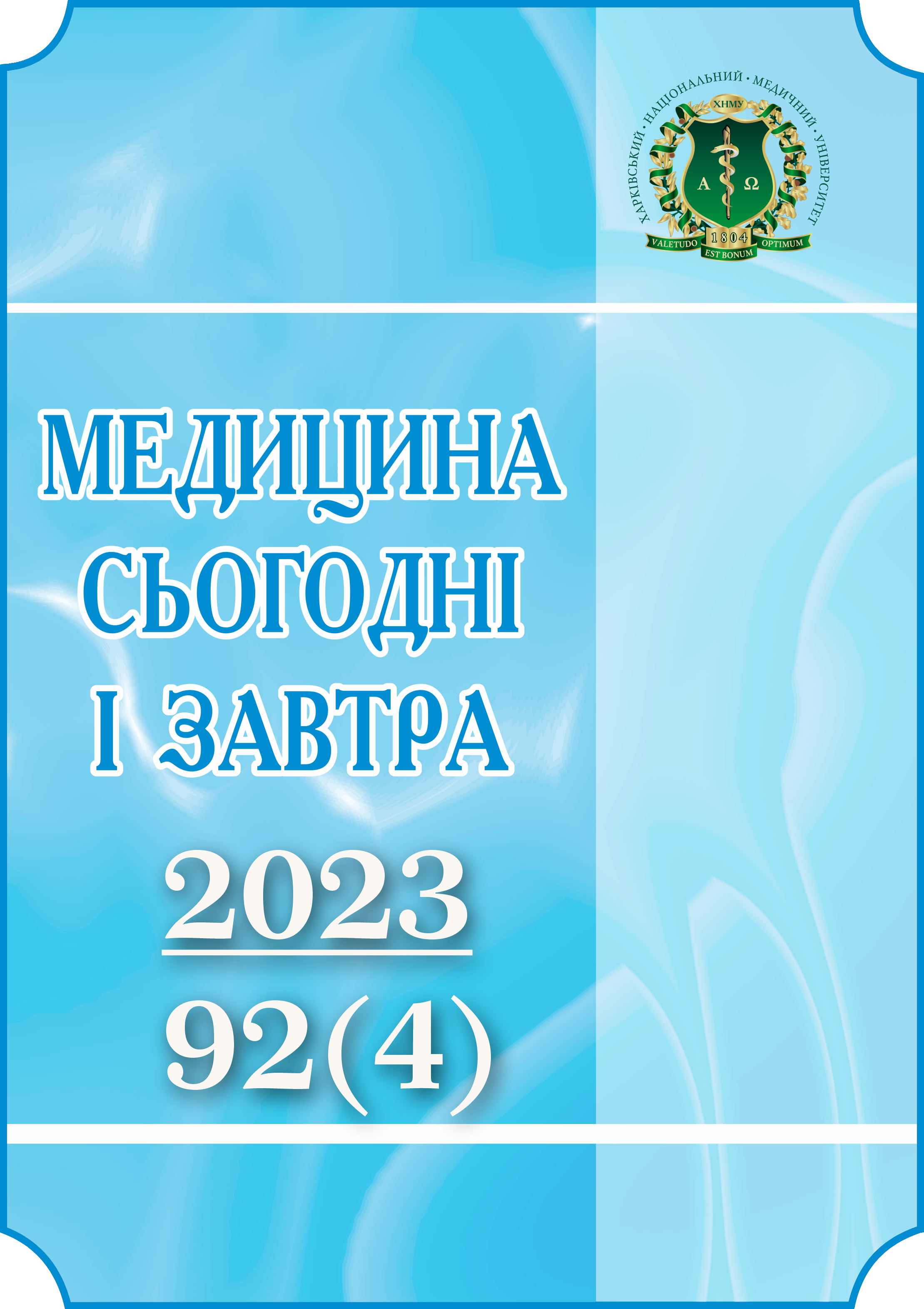Abstract
The SARS-CoV-2 virus is neurotropic because its adhesion protein has a high affinity for Angiotensin-Converting Enzyme 2 receptors, which are expressed, among other things, on the endothelium of cerebral capillaries. There are several theories of the pathogenesis of brain damage in COVID-19: direct viral damage, hypoxia/ischemia and systemic inflammation, autoimmune damage. The study was conducted to study the clinical and psychopathological features of anxiety disorders in patients who suffered from COVID-19. During 2020–2022, 94 patients (49 men and 55 women) with an average age of (33.0±5.0) years who suffered from COVID-19 and were diagnosed with anxiety disorders were examined. According to the results of the study was found: a characteristic low mood background; feeling anxious; unmotivated anxiety; internal tension with inability to relax; anxious fears; intrusive anxious thoughts that intensify in the evening and at night, which prevents falling asleep; attacks of fear, which are accompanied by suffocation, a feeling of unreality, fear of death; exaggerated wariness; inability to control anxiety; feeling of loss of control over one's life; irritability; decreased ability to concentrate; motor tension; autonomic hyperactivity; sleep disorders. The data obtained in the course of the study formed the basis for the development of a comprehensive personalized program for the correction of anxiety disorders in patients with COVID-19 with differentiated use of psychopharmacotherapy, psychotherapy and psychoeducation. It was concluded that patients are characterized by pronounced manifestations of anxiety disorders: prolonged anxiety-depressive reaction, panic disorder, generalized anxiety disorder; anxiety disorder of an organic nature.
Keywords: SARS-CoV-2 virus, neurotropic virus, anxiety, depressive states.
References
Maruta NO, Fedchenko VIu, Yavdak IO, Lapinska OR, Kanurnyi II. Peculiarities of mental disorders after the transferred coronavirus disease COVID-19 (psychosocial factors, quality of life). Ukrains'kyi visnyk psykhonevrolohii. 2022;30(3(112):71-2. DOI:10.36927/2079-0325-V30-is3-2022-66. [In Ukrainian].
Talevi D, Socci V, Carai M, Carnaghi G, Faleri S, Trebbi E, et al. Mental health outcomes of the COVID-19 pandemic. Riv Psichiatr. 2020;55(3):137-44. DOI: 10.1708/3382.33569. PMID: 32489190.
The experience of experiencing the COVID-19 pandemic: remote psychological research, remote psychological support: materials of the online seminars on 23 Apr 2020 "The experience of quarantine: remote psychological help and support" and on 15 May 2020 "Remote psychological research in the conditions of the COVID-19 pandemic and quarantine". Kyiv; 2020. 68 p. DOI:10.33120/QERPAProceeding-2020. [In Ukrainian].
Sher L. The impact of the COVID-19 pandemic on suicide rates. QJM: An International Journal of Medicine. 2020;113(10):707-12. DOI: 10.1093/qjmed/hcaa202. PMID: 32539153.
Maruta NO, Fedchenko VYu, Panko TV, Yavdak IO, Semikina OYe, Lapinska OR. Features of primary psychopathological disorders due to coronavirus disease COVID-19. Ukrains'kyi visnyk psykhonevrolohii [Ukrainian Herald of Psychoneurology]. 2023;31(1(114)):60-9. DOI: 10.36927/2079-0325-V31-is1-2023-9. [In Ukrainian].
WHO COVID-19 Dashboard [Internet]. Available at: https://covid19.who.int [accessed 20 Dec 2023].
Maruta NO, Fedchenko VYu, Panko TV, Yavdak IO, Semikina OYe, Lapinska OR, Markozova LM. Clinical and anamnestic correlates of the formation of newly diagnosed mental disorders in patients who suffered from COVID-19 and were exposed to the stressors of the SARS-CoV-2 pandemic. Ukrains'kyi visnyk psykhonevrolohii [Ukrainian Herald of Psychoneurology]. 2023;31(4(117)):75-81. DOI: 10.36927/2079-0325-V31-is4-2023-11. [In Ukrainian].
United Nations. Policy Brief: COVID-19 and the Need for Action on Mental Health. 13 May 2020. 17 p. Available at: https://unsdg.un.org/sites/default/files/2020-05/UN-Policy-Brief-COVID-19-and-mental-health.pdf
Nikishkova IM. The problem of profile and duration of cognitive impairments associated with COVID-19 (literature review). Ukrains'kyi visnyk psykhonevrolohii [Ukrainian Herald of Psychoneurology]. 2023;31(2(115)):98-104. DOI: 10.36927/2079-0325-V31-is2-2023-14. [In Ukrainian].
Dubey S, Biswas P, Ghosh R, Chatterjee S, Dubey MJ, Chatterjee S. Psychosocial impact of covid-19. Diabetes & Metabolic Syndrome: Clinical Research & Reviews. 2020;14(5):779-88. DOI: 10.1016/j.dsx.2020.05.035. PMID: 32526627.
Kozhyna HM, Strelnikova IM, Tieroshyna IF. Adaptation disorders in relatives of patients with COVID-19. The journal оf the European psychiatric association. 2021;64:283.
Hamilton M. The assessment of anxiety states by rating. Br J Med Psychol. 1959;32:50-5. DOI: 10.1111/j.2044-8341.1959.tb00467.x. PMID: 13638508.
Hamilton MA. Rating scale for depression. Journal of Neurology, Neurosurgery and Psychiatry. 1960;23:563-62. PMID: 14399272.
Spielberger CD, Gorssuch RL, Lushene PR, Vagg PR, Jacobs GA. Manual for the State-Trait Anxiety Inventory. Pers Individ Differ. 1982;3:361-72. Available at: http://www.med.uottawa.ca/courses/cmed6203/index_notes/stai.pdf
Nemchin TA. States of nervous and mental stress. USSR: 1983. 167 p.

This work is licensed under a Creative Commons Attribution-NonCommercial-ShareAlike 4.0 International License.

